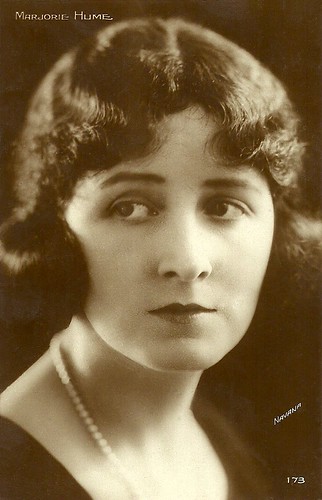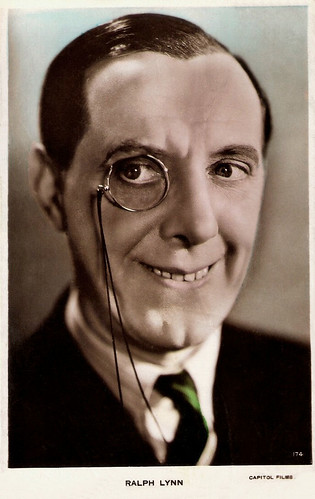Marjorie Hume (1900-1976) was a prolific and well-known actress in the British cinema of the 1920s, often playing aristocratic roles. She appeared in 40 films between 1917 and 1957.
![Marjorie Hume]()
French postcard by Cinémagazine, no. 173. Photo: Navana.
Marjorie (also: Marjory) Hume was born in 1893 in Gorleston, Great Yarmouth, United Kingdom, in 1893. (Wikipedia and IMDb both give a birth year of 1900, but according to The Hitchcock Zone her birth was registered Q1 1893.) She was the daughter of Captain Arthur Hume and Violet Margaret Isabel Hume.
Maejorie started her film career with a small part in the Ellen Terry vehicle Her Greatest Performance (Fred Paul, 1917). In this crime film, Terry played a retired actress who poses as a dresser to scare a murderer into confessing and clearing her son.
Immediately after this, Hume played the female lead - a girl - in the Doing his bit (Edwin J. Collins, 1917). In this comedy written by and starring the cross dressing star George Robey, Robey played an Army reject, who poses as a woman and becomes a nurse.
This was followed by parts in the dramas The Red Pottage (Meyrick Milton, 1918) starring C. Aubrey Smith, The Swindler (Maurice Elvey, 1919), and Keeper of the Door (Maurice Elvey, 1919).
Hume really peaked in the early 1920s with leading roles in the sports film The Scarlett Kiss (Fred Goodwins, 1920), the romance The Duchess of Seven Dials (Fred Paul, 1920), the drama Lady Tetley's Decree (Fred Paul, 1920), the Dutch-British romance Kitty Tailleur (Frank Richardson, 1921), and the drama Bluff (Geoffrey Mahlins, 1921).
Then she played in two Anglo-American coproductions, The Call of Youth (Hugh Ford, 1921) and The Great Day (Hugh Ford, 1921). Both were made in collaboration with Famous Players-Lasky. Alfred Hitchcock is credited as the title designer for both films.
![Ellen Terry]()
Ellen Terry. British postcard by Rotary Photo, no. 151 I
Marjorie Hume appeared in the drama Appearances (Donald Crisp, 1921; now considered a lost film), the fantasy mystery Silent Evidence (E.H. Calvert, 1922), and the Lord Byron biopic A Prince of Lovers (Charles Calvert, 1922).
Then followed the historical drama Simone Evrard; or Deathless Devotion (Edwin Greenwood, 1923) and the adventure film M'Lord of the White Road (Arthur Rooke, 1923) starring Victor McLaglen.
In France, she appeared in the melodrama Les deux gosses/Two Little Vagabonds (Louis Mercanton, 1924) with Carlyle Blackwell and Gabriel Signoret.
Back in England, she starred in The Wonderful Wooing (Geoffrey Mahlins, 1925), The Squire of Long Hadley (Sinclair Hill, 1925) with Brian Aherne, and King of the Castle (Henry Edwards, 1925) again with Aherne.
The following years, she made Thou Fool (Fred Paul, 1926) with Stewart Rome, The Island of Despair (Henry Edwards, 1926) with Matheson Lang, and One Colombo Night (Henry Edwards, 1926).
Her last silent films were the comedy The Mariage Business (Leslie Hiscott, 1927) with Estelle Brody,Afterwards (Lawson Butt, 1928), and The Triumph of the Scarlet Pimpernel (T. Hayes Hunter, 1928) with Matheson Lang.
![Marjorie Hume]()
British postcard in the Picturegoer Series, London, no. 130. Photo: Navana.
Marjorie Hume's first sound film was the drama Lord Richard in the Pantry (Walter Forde, 1930) starring Richard Cooper. In 1931 she played opposite former silent stars Stewart Rome and Warwick Ward in the crime film Deadlock (George King, 1931), followed by the crime film Betrayal (Reginald Fogwell, 1932), again with Rome in the male lead.
Next came the Ralph Lynn comedy Up to the Neck (Jack Travers, 1933), the drama A Royal Demand (Gustav Mindzenti, 1933), a small part in the mystery film The White Lilac (Albert Parker, 1935), Cross Currents (Adrian Brunel, 1935), and the crime film Member of the Jury (Bernard Mainwaring, 1937).
From the late 1930s to the early 1950s Marjorie Hume did not perform in film. After the war she returned in small parts, as the landlady in the spy story The Limping Man (Cy Endfield, Charles de la Tour, 1953) starring Lloyd Bridges, and as Lady Redscarfe in the comedy Children Galore (Terence Fisher, 1955).
Marjorie Hume's last film role was an uncredited part as the Mother in the successful Hammer production The Curse of Frankenstein (Terence Fisher, 1957) starring Peter Cushing and Christopher Lee.
In 1976, Marjorie Hume died in Oxshott, United Kingdom. She was married to Eric Lindsey.
![Ralph Lynn]()
Ralph Lynn. British postcard, no. 174. Photo: Capitol Films.
Sources: Thomas Staedeli (Cyranos), The Hitchcock Zone, Getty Images, Wikipedia, and IMDb.

French postcard by Cinémagazine, no. 173. Photo: Navana.
The Call of Youth
Marjorie (also: Marjory) Hume was born in 1893 in Gorleston, Great Yarmouth, United Kingdom, in 1893. (Wikipedia and IMDb both give a birth year of 1900, but according to The Hitchcock Zone her birth was registered Q1 1893.) She was the daughter of Captain Arthur Hume and Violet Margaret Isabel Hume.
Maejorie started her film career with a small part in the Ellen Terry vehicle Her Greatest Performance (Fred Paul, 1917). In this crime film, Terry played a retired actress who poses as a dresser to scare a murderer into confessing and clearing her son.
Immediately after this, Hume played the female lead - a girl - in the Doing his bit (Edwin J. Collins, 1917). In this comedy written by and starring the cross dressing star George Robey, Robey played an Army reject, who poses as a woman and becomes a nurse.
This was followed by parts in the dramas The Red Pottage (Meyrick Milton, 1918) starring C. Aubrey Smith, The Swindler (Maurice Elvey, 1919), and Keeper of the Door (Maurice Elvey, 1919).
Hume really peaked in the early 1920s with leading roles in the sports film The Scarlett Kiss (Fred Goodwins, 1920), the romance The Duchess of Seven Dials (Fred Paul, 1920), the drama Lady Tetley's Decree (Fred Paul, 1920), the Dutch-British romance Kitty Tailleur (Frank Richardson, 1921), and the drama Bluff (Geoffrey Mahlins, 1921).
Then she played in two Anglo-American coproductions, The Call of Youth (Hugh Ford, 1921) and The Great Day (Hugh Ford, 1921). Both were made in collaboration with Famous Players-Lasky. Alfred Hitchcock is credited as the title designer for both films.

Ellen Terry. British postcard by Rotary Photo, no. 151 I
The Triumph of the Scarlet Pimpernel
Marjorie Hume appeared in the drama Appearances (Donald Crisp, 1921; now considered a lost film), the fantasy mystery Silent Evidence (E.H. Calvert, 1922), and the Lord Byron biopic A Prince of Lovers (Charles Calvert, 1922).
Then followed the historical drama Simone Evrard; or Deathless Devotion (Edwin Greenwood, 1923) and the adventure film M'Lord of the White Road (Arthur Rooke, 1923) starring Victor McLaglen.
In France, she appeared in the melodrama Les deux gosses/Two Little Vagabonds (Louis Mercanton, 1924) with Carlyle Blackwell and Gabriel Signoret.
Back in England, she starred in The Wonderful Wooing (Geoffrey Mahlins, 1925), The Squire of Long Hadley (Sinclair Hill, 1925) with Brian Aherne, and King of the Castle (Henry Edwards, 1925) again with Aherne.
The following years, she made Thou Fool (Fred Paul, 1926) with Stewart Rome, The Island of Despair (Henry Edwards, 1926) with Matheson Lang, and One Colombo Night (Henry Edwards, 1926).
Her last silent films were the comedy The Mariage Business (Leslie Hiscott, 1927) with Estelle Brody,Afterwards (Lawson Butt, 1928), and The Triumph of the Scarlet Pimpernel (T. Hayes Hunter, 1928) with Matheson Lang.

British postcard in the Picturegoer Series, London, no. 130. Photo: Navana.
The Curse of Frankenstein
Marjorie Hume's first sound film was the drama Lord Richard in the Pantry (Walter Forde, 1930) starring Richard Cooper. In 1931 she played opposite former silent stars Stewart Rome and Warwick Ward in the crime film Deadlock (George King, 1931), followed by the crime film Betrayal (Reginald Fogwell, 1932), again with Rome in the male lead.
Next came the Ralph Lynn comedy Up to the Neck (Jack Travers, 1933), the drama A Royal Demand (Gustav Mindzenti, 1933), a small part in the mystery film The White Lilac (Albert Parker, 1935), Cross Currents (Adrian Brunel, 1935), and the crime film Member of the Jury (Bernard Mainwaring, 1937).
From the late 1930s to the early 1950s Marjorie Hume did not perform in film. After the war she returned in small parts, as the landlady in the spy story The Limping Man (Cy Endfield, Charles de la Tour, 1953) starring Lloyd Bridges, and as Lady Redscarfe in the comedy Children Galore (Terence Fisher, 1955).
Marjorie Hume's last film role was an uncredited part as the Mother in the successful Hammer production The Curse of Frankenstein (Terence Fisher, 1957) starring Peter Cushing and Christopher Lee.
In 1976, Marjorie Hume died in Oxshott, United Kingdom. She was married to Eric Lindsey.

Ralph Lynn. British postcard, no. 174. Photo: Capitol Films.
Sources: Thomas Staedeli (Cyranos), The Hitchcock Zone, Getty Images, Wikipedia, and IMDb.